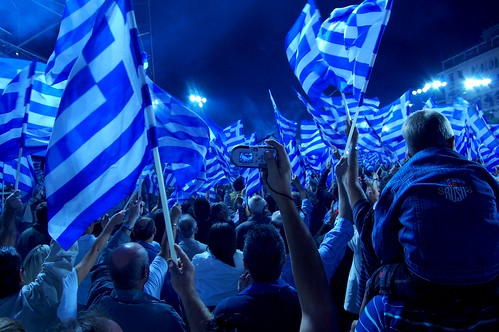
Or Far From the Madding Crowd as perhaps the elections should be named, considering the fact that few, if any of the members of the coalition government are able to campaign in public. Instead of the mass rallies that usually mark elections in Greece, both PASOK and New Democracy politicians have been careful to hold meetings behind closed doors with just the party faithful present.
With just two weeks to go the national election campaign has been so low key as to be considered to be virtually non-existent,. No election centres have been set up and campaign billboards and handouts are nowhere to be seen. This is partly a financial matter as the two main parties owe 240 million euros and only last week did they manage to pass legislation to reschedule their debts (a privilege they ruled out for lesser mortals, or voters as they are know locally).Instead of a country plastered in posters and drowning in flyers PASOK and New Democracy have reserved their efforts for TV talk shows and the internet. Both choices are problematic; TV has been shedding viewers for years, especially among the young and more educated and social media is not a comfortable environment for politicians unused to debating with voters except on their own terms. Indeed their ham fisted attempts to replicate traditional electoral methods online have been met with derision and biting humour by Greek language bloggers and Twitter users.
However, even more troublesome than lack of funds is the growing realisation that parties that took part in the various coalitions in the last year are now unable to talk directly to voters.Public anger with the government and the political system in general has reached such a pitch that even their presence provokes angry, sometimes violent reaction from the electorate. Rising unemployment, an endless series of tax hikes and a collapsing economy have all helped generate a level of disgust with public figures unprecedented in modern Greek political history.
The tipping point proved to be last 28th October when people attending the annual military parade in the northern port city of Thessaloniki closed roads and jeered the country's president, forcing him and other present in the VIP stands to flee. Ever since then politicians have done their best to avoid making public appearances whenever possible. The only exception being the 25th March Independence parade in Athens but only after presence of nearly 10,000 police officers ensured that no possible public protest was possible.
For the first time in a generation there is a real possibility that neither PASOK nor New Democracy will be in a position to rule, either alone or even in coalition, if recent polls are to be believed. Even with gift of 50 extra seats that the constitution gives to the party with the most votes, PASOK and New Democracy may be forced to seek other coalition partners. Even turnout is low then their rump support may be enough to win the day, however, if people decide to vote in greater numbers in order to punish ruling politicians as many as 10 parties will be entering parliament.
Given the the unpopularity of the current austerity measures any party that signs up to enforce yet more of them is flirting with backbench revolt and voter backlash. The falling poll figures for PASOK, New Democracy and the far right LAOS party are testament to that.
Given the fractured ideological natures of the new parties( which may include members of the neo-Nazi Golden Dawn) and the lack of support for austerity the most likely outcome is a series of elections which, given the commitment of the previous government to cut wages and pensions while raising new taxes in June likely to diminish the power of both Evangelos Venizelos and Antonis Samaras, both of whom are faced with the prospect of leadership challenges from disgruntled backbencher unhappy with their parties' choices and anxious to rid themselves of those associated with deeply unpopular policies.
1 comment:
I think at this point it's difficult to qualify what will have a greater impact, voter apathy or voter backlash - which in this case may be six of one or half a dozen of the other, anyway. I don't think we need a poll to state the obvious ... which is that obviously what happens here in Greece defies all logic anyway. The government might just as well start charging a fee for using the ballot box.
What would concern me is that these are dangerous times in that a fallen people are easily led astray by anyone who is smart enough to tell folks what they want to hear, be they Neo-Nazis or Village Idiots. Nevertheless, the mindlessness of Greek election campaign tactics and voter strategy sort of levels the playing field to some extent. Speaking of mindlessness, here is a very relevant quote that speaks volumes of the recent poll ... and Greek politics in general: "Votes are like trees, if you are trying to build a forest. If you have more trees than you have forests, then at that point the pollsters will probably say you will win." (Dan Quayle, former Vice President of the USA).
Post a Comment